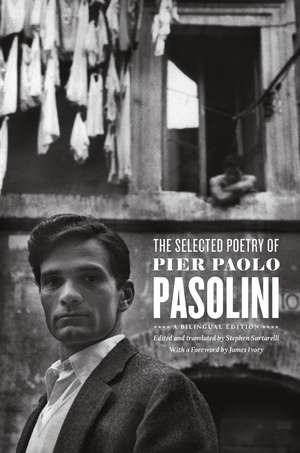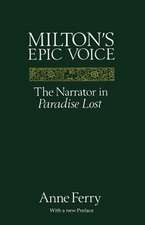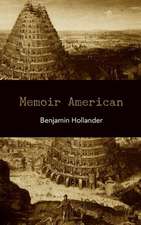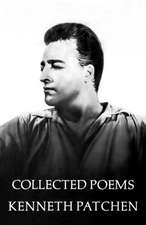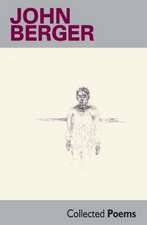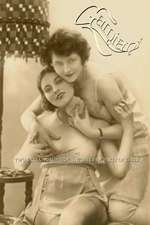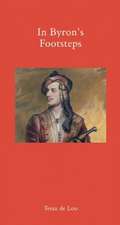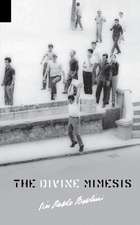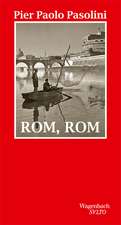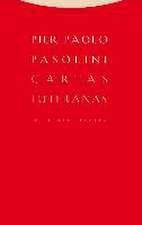The Selected Poetry of Pier Paolo Pasolini: A Bilingual Edition
Autor Pier Paolo Pasolini Editat de Stephen Sartarelli Cuvânt înainte de James Ivoryen Limba Engleză Paperback – 22 oct 2015
Most people outside Italy know Pier Paolo Pasolini for his films, many of which began as literary works—Arabian Nights, The Gospel According to Matthew, The Decameron, and The Canterbury Tales among them. What most people are not aware of is that he was primarily a poet, publishing nineteen books of poems during his lifetime, as well as a visual artist, novelist, playwright, and journalist. Half a dozen of these books have been excerpted and published in English over the years, but even if one were to read all of those, the wide range of poetic styles and subjects that occupied Pasolini during his lifetime would still elude the English-language reader.
For the first time, Anglophones will now be able to discover the many facets of this singular poet. Avoiding the tactics of the slim, idiosyncratic, and aesthetically or politically motivated volumes currently available in English, Stephen Sartarelli has chosen poems from every period of Pasolini’s poetic oeuvre. In doing so, he gives English-language readers a more complete picture of the poet, whose verse ranged from short lyrics to longer poems and extended sequences, and whose themes ran not only to the moral, spiritual, and social spheres but also to the aesthetic and sexual, for which he is most known in the United States today. This volume shows how central poetry was to Pasolini, no matter what else he was doing in his creative life, and how poetry informed all of his work from the visual arts to his political essays to his films. Pier Paolo Pasolini was “a poet of the cinema,” as James Ivory says in the book’s foreword, who “left a trove of words on paper that can live on as the fast-deteriorating images he created on celluloid cannot.”
This generous selection of poems will be welcomed by poetry lovers and film buffs alike and will be an event in American letters.
For the first time, Anglophones will now be able to discover the many facets of this singular poet. Avoiding the tactics of the slim, idiosyncratic, and aesthetically or politically motivated volumes currently available in English, Stephen Sartarelli has chosen poems from every period of Pasolini’s poetic oeuvre. In doing so, he gives English-language readers a more complete picture of the poet, whose verse ranged from short lyrics to longer poems and extended sequences, and whose themes ran not only to the moral, spiritual, and social spheres but also to the aesthetic and sexual, for which he is most known in the United States today. This volume shows how central poetry was to Pasolini, no matter what else he was doing in his creative life, and how poetry informed all of his work from the visual arts to his political essays to his films. Pier Paolo Pasolini was “a poet of the cinema,” as James Ivory says in the book’s foreword, who “left a trove of words on paper that can live on as the fast-deteriorating images he created on celluloid cannot.”
This generous selection of poems will be welcomed by poetry lovers and film buffs alike and will be an event in American letters.
Preț: 172.83 lei
Nou
Puncte Express: 259
Preț estimativ în valută:
33.11€ • 34.86$ • 27.33£
33.11€ • 34.86$ • 27.33£
Carte disponibilă
Livrare economică 02-16 ianuarie 25
Livrare express 18-24 decembrie pentru 67.51 lei
Preluare comenzi: 021 569.72.76
Specificații
ISBN-13: 9780226325446
ISBN-10: 022632544X
Pagini: 512
Ilustrații: 10 halftones
Dimensiuni: 152 x 229 x 30 mm
Greutate: 0.68 kg
Ediția:Bilingvă
Editura: University of Chicago Press
Colecția University of Chicago Press
ISBN-10: 022632544X
Pagini: 512
Ilustrații: 10 halftones
Dimensiuni: 152 x 229 x 30 mm
Greutate: 0.68 kg
Ediția:Bilingvă
Editura: University of Chicago Press
Colecția University of Chicago Press
Notă biografică
Pier Paolo Pasolini (1922–75) was an Italian film director, writer, and intellectual. Stephen Sartarelli has translated widely from French and Italian, most recently works by Andrea Camilleri and Gabriele D’Annunzio.
Cuprins
List of Illustrations
Foreword
Acknowledgments
Pier Paolo Pasolini: A Life in Poetry
A Note on the Texts
I. Da La meglio gioventù (1954)
From The Best of Youth (The Friulian Poems)
Il nini muàrt / Dead Boy
David / David
Tornant al Paìs / Returning to the Village
Ciant da li Ciampanis / Song of the Bells
La domènia uliva / Olive Sunday
Dansa di Narcìs / Narcissus Dancing
Pastorela di Narcìs / Narcissus Pastourelle
Il dì de la me muàrt / The Day of My Death
Laris / Thieves
Conzèit / Envoi
II. Da L’usignolo della Chiesa Cattolica (1958)
From The Nightingale of the Catholic Church
Le Albe / Dawns
La Passione / The Passion
In Memoriam / In Memoriam
Litania / Litany
Lingua / Language
Un Cristo / A Christ
Memorie / Memories
L’ex-vita / My Former Life
Ballata del delirio / Delirium Ballad
La scoperta di Marx / Discovering Marx
Poesiole notturne / Little Night Poems
III. Da IDiari (1950)
From The Diaries
“Adulto? Mai—mai, come l’esistenza” /“Adult? Never, never—like life itself”
“Sarebbe così facile svelare”/“It would be so easy to unveil”
“Pieno di confidenza e di tepore”/“Full of intimacy and warmth”
“Chiusa la festa su una Roma sorda”/“At holiday’s end, in a Rome deaf”
“La piogga ha verniciato la terra”/“Rain has varnished the earth”
“Se qualcuno mi chiede” /“Should anyone ask me”
“Interrotto nel momento più limpido”/“Interrupted at the clearest of moments”
“Come in uno spasimo del pensiero” /“As in a spasm of thought”
“Correvo nel crepuscolo fangoso” / “I was running in the muddy twilight”
IV. Da Le ceneri di Gramsci (1957) / From Gramsci’s Ashes
L’Appennino / The Apennines
Le ceneri di Gramsci / Gramsci’s Ashes
Il pianto della scavatrice / The Cry of the Excavator
V. Da La Religione del mio tempo (1961) / From The Religion of My Time
La Ricchezza / Riches
Da La Religione del mio tempo / From The Religion of My Time
Appendice alla “Religione”: Una luce / Appendix to “The Religion of My Time”: A Light
Al principe / To the Prince
A Bertolucci / To Bertolucci
Alla mia nazione / To My Country
Frammento alla morte / To Death: A Fragment
La Rabbia / Rage
VI. Da Poesia in forma di rosa (1964) / From Poem in the Shape of a Rose
Da “Poesie mondane” / from “Worldly Poems”
23 aprile 1962/ April 23, 1962
25 aprile 1962 / April 25, 1962
10 giugno 1962 /June 10, 1962
12 giugno 1962 /June 12, 1962
Supplica a mia madre / Plea to My Mother
La persecuzione / Persecution
Una disperata vitalità / A Desperate Vitality
Marilyn / Marilyn
Profezia / Prophecy
VII. Da Trasumanar e organizzar (1971) / From Transhumanize and Organize
Richiesta di lavoro / Job Request
Preghiera su commissione / Commissioned Prayer
Uno dei tanti epiloghi / One of Many Epilogues
Canto civile / Civic Song
La strada delle puttane / The Whores’ Road
Versi del testamento / Lines from the Testament
La poesia della tradizione / The Poetry of Tradition
Atene / Athens
Timor di me? / Timor di me?
La presenza / Presence
Ossessione soteriologica / Soteriological Obsession
Appunto / Note
Gli ultimi sogni prima di morire / Last Dreams Before Dying
Introduzione / Introduction
Materiali per l’Introduzione / Materials for the Introduction
Altri materiali, c.s. / Other Materials (as above)
Il giardino dei pesci / The Garden of Fish
VIII. Last Poems
Da “L’hobby del sonetto” / From “The Sonnet Hobby”
[1] “Qual è l’idea felice che mi risveglia?”/
“What happy thought wakes me today?”
[13] “Perché mi fermi, a un’ora in cui ci si incontra” /
“Why do you stop me, when by sad coincidence”
[20] “Ascoltate, Signore, questa storia estiva.” /
“Listen, Lord, to this summer story.”
[55] “Non c’era Ninetto, quando guardavo”
“Ninetto wasn’t there, when as a good”
[63] “Volevo semplicemente dire”/ “I wanted simply to say”
[105] “Erano quasi le due di notte—il vento” /
“It was almost two in the morning—the wind”
[110] “C’era nel mondo—nessuno lo sapeva”/
“There was, in the world—though nobody knew it –”
Castalia / Castalia
Saluto e augurio / Goodbye and Best Wishes
Notes
Selected Bibliography and Filmography
Index of Titles and First Lines
Foreword
Acknowledgments
Pier Paolo Pasolini: A Life in Poetry
A Note on the Texts
I. Da La meglio gioventù (1954)
From The Best of Youth (The Friulian Poems)
Il nini muàrt / Dead Boy
David / David
Tornant al Paìs / Returning to the Village
Ciant da li Ciampanis / Song of the Bells
La domènia uliva / Olive Sunday
Dansa di Narcìs / Narcissus Dancing
Pastorela di Narcìs / Narcissus Pastourelle
Il dì de la me muàrt / The Day of My Death
Laris / Thieves
Conzèit / Envoi
II. Da L’usignolo della Chiesa Cattolica (1958)
From The Nightingale of the Catholic Church
Le Albe / Dawns
La Passione / The Passion
In Memoriam / In Memoriam
Litania / Litany
Lingua / Language
Un Cristo / A Christ
Memorie / Memories
L’ex-vita / My Former Life
Ballata del delirio / Delirium Ballad
La scoperta di Marx / Discovering Marx
Poesiole notturne / Little Night Poems
III. Da IDiari (1950)
From The Diaries
“Adulto? Mai—mai, come l’esistenza” /“Adult? Never, never—like life itself”
“Sarebbe così facile svelare”/“It would be so easy to unveil”
“Pieno di confidenza e di tepore”/“Full of intimacy and warmth”
“Chiusa la festa su una Roma sorda”/“At holiday’s end, in a Rome deaf”
“La piogga ha verniciato la terra”/“Rain has varnished the earth”
“Se qualcuno mi chiede” /“Should anyone ask me”
“Interrotto nel momento più limpido”/“Interrupted at the clearest of moments”
“Come in uno spasimo del pensiero” /“As in a spasm of thought”
“Correvo nel crepuscolo fangoso” / “I was running in the muddy twilight”
IV. Da Le ceneri di Gramsci (1957) / From Gramsci’s Ashes
L’Appennino / The Apennines
Le ceneri di Gramsci / Gramsci’s Ashes
Il pianto della scavatrice / The Cry of the Excavator
V. Da La Religione del mio tempo (1961) / From The Religion of My Time
La Ricchezza / Riches
Da La Religione del mio tempo / From The Religion of My Time
Appendice alla “Religione”: Una luce / Appendix to “The Religion of My Time”: A Light
Al principe / To the Prince
A Bertolucci / To Bertolucci
Alla mia nazione / To My Country
Frammento alla morte / To Death: A Fragment
La Rabbia / Rage
VI. Da Poesia in forma di rosa (1964) / From Poem in the Shape of a Rose
Da “Poesie mondane” / from “Worldly Poems”
23 aprile 1962/ April 23, 1962
25 aprile 1962 / April 25, 1962
10 giugno 1962 /June 10, 1962
12 giugno 1962 /June 12, 1962
Supplica a mia madre / Plea to My Mother
La persecuzione / Persecution
Una disperata vitalità / A Desperate Vitality
Marilyn / Marilyn
Profezia / Prophecy
VII. Da Trasumanar e organizzar (1971) / From Transhumanize and Organize
Richiesta di lavoro / Job Request
Preghiera su commissione / Commissioned Prayer
Uno dei tanti epiloghi / One of Many Epilogues
Canto civile / Civic Song
La strada delle puttane / The Whores’ Road
Versi del testamento / Lines from the Testament
La poesia della tradizione / The Poetry of Tradition
Atene / Athens
Timor di me? / Timor di me?
La presenza / Presence
Ossessione soteriologica / Soteriological Obsession
Appunto / Note
Gli ultimi sogni prima di morire / Last Dreams Before Dying
Introduzione / Introduction
Materiali per l’Introduzione / Materials for the Introduction
Altri materiali, c.s. / Other Materials (as above)
Il giardino dei pesci / The Garden of Fish
VIII. Last Poems
Da “L’hobby del sonetto” / From “The Sonnet Hobby”
[1] “Qual è l’idea felice che mi risveglia?”/
“What happy thought wakes me today?”
[13] “Perché mi fermi, a un’ora in cui ci si incontra” /
“Why do you stop me, when by sad coincidence”
[20] “Ascoltate, Signore, questa storia estiva.” /
“Listen, Lord, to this summer story.”
[55] “Non c’era Ninetto, quando guardavo”
“Ninetto wasn’t there, when as a good”
[63] “Volevo semplicemente dire”/ “I wanted simply to say”
[105] “Erano quasi le due di notte—il vento” /
“It was almost two in the morning—the wind”
[110] “C’era nel mondo—nessuno lo sapeva”/
“There was, in the world—though nobody knew it –”
Castalia / Castalia
Saluto e augurio / Goodbye and Best Wishes
Notes
Selected Bibliography and Filmography
Index of Titles and First Lines
Recenzii
"An accused blasphemer deeply devoted to Franciscan Catholicism, a Gramscian communist permanently expelled from the party, an avowed homosexual dedicated to the consensual sexual freedom of everyone, a champion of the local on a global scale, a neorealist of the imagination, and a radically innovative poet alienated from the existing practices of the avant-garde: Pasolini is not so much a figure of contradictions as he is a force against the incoherence hiding in every hypocrisy."
"This substantial bilingual edition of 76 poems, most drawn from seven major collections published in Italian between 1954 and 1971 and including some that appeared posthumously in 2003, is a welcome step toward redressing the damaging imbalance in the image of Pasolini conventionally offered to readers of English. Sartarelli's intelligent, stylish translations are accompanied by copious and helpful notes, a bibliography and filmography, and a spirited and very useful introduction. Wide-ranging, authoritative, and handsomely produced, Sartarelli's volume establishes itself immediately as by far the best selection of Pasolini's poetry available in English; its publication is a landmark in Pasolini studies. . . . Essential."
“Pasolini is known as a filmmaker and political rebel, and for his tragic death, yet he was first and most importantly a poet. Sartarelli’s brilliant translations have at last made his searingly beautiful poetry available to English-language readers.”
“Sartarelli’s impeccable and inspired translations will be of incommensurable value to all students of Pasolini’s oeuvre. This new English edition of Pasolini’s poems is the most comprehensive and the most accurate version available in the Anglo-American world. Although Pasolini saw himself primarily as a poet, outside Italy his vast poetic production has not received the critical attention it certainly deserves. Sartarelli’s generous selection and his sincere dedication will enhance our understanding of one of the major European artists of the twentieth century.”
“The remarkable range of Pasolini’s poetic achievements, which in myriad ways underpin his renowned work in cinema and fiction, is brilliantly represented in Sartarelli’s impressive bilingual edition. His translations convincingly convey Pasolini’s densely woven, allusive poems, their musicality, passion, and lyricism. The touch of Sartarelli’s confident, sensitive hand, of a poet who is also a scholar, has brought a most welcome new edition of one of the most important literary and cultural figures of the twentieth century.”
